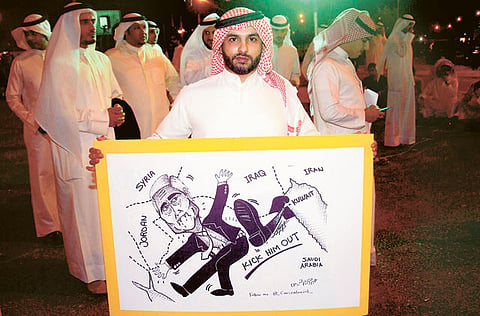Bloodshed beginning to backfire on Al Assad
US prepares for final break with its two-year-old policy of engaging regime

Beirut: Syrian President Bashar Al Assad's attempt to crush dissent with a massive military offensive appears to be backfiring, with fervent condemnations both at home and abroad undermining his government's chances of survival.
The bloodshed of the past 10 days has drawn the ire of regional powers that had stayed silent throughout the nearly five-month-old uprising but were outraged by the killings of fellow Muslims during Ramadan. It has also prompted calls for a tougher stand in the West, particularly from Washington. The Obama administration has stopped just short of demanding Al Assad's ouster, but it appeared to be edging closer to that position.
State Department spokeswoman Victoria Nuland told reporters that "you can't have any kind of partnership with a regime that does this kind of thing to innocents," an indication that Washington is preparing for a final break with its two-year-old policy of engaging Al Assad. US officials are readying additional economic sanctions on Syria and are encouraging European countries to impose bans on its oil and gas sales.
The coming days are also expected to bring renewed pressure at the UN for firmer action against Syria.
Duplicate tactics
By sending tanks into the city of Hama and other rebellious areas, Al Assad may have been hoping to duplicate the tactics of his father, Hafez, whose successful suppression of an uprising in Hama in 1982 left an estimated 10,000 people dead. It took weeks before the world found out, by which time an entire generation of Syrians had been cowed into silence. But in an age of satellite television and instant communications, "they're not getting away with it," said Najeeb Ghadbian, a professor of political science at the University of Arkansas, who is active in the Syrian opposition.
"This regime is living in an isolated world, and they think they can get away with mass killings, but, on the contrary, it is only hastening their departure," he said.
There is no sign that Al Assad's fall is imminent. Opposition hopes for significant defections from the army or divisions in the government have not materialised. The protest movement remains without leaders and has offered no plan for replacing Al Assad, other than to continue staging protests. But the government can expect to confront escalating pressure not only from its domestic opponents but also the wider world. The violence has strained Syria's close relationship with Turkey, the country considered most likely to wield influence over Al Assad.
Turkish Foreign Minister Ahmet Davutoglu emerged seemingly empty-handed from a six-hour meeting with Al Assad on Tuesday in Damascus, after issuing what the Turkish media called an ultimatum to stop the killing. Davutoglu said only that the encounter was "friendly" and that he expected to see "concrete steps" in the coming days to end the violence.
Yet Al Assad remained defiant, saying Syria would not relent in its pursuit of "armed terrorists," according to the official Syrian Arab News Agency.
And human rights groups reported that Syrian troops on Tuesday had launched a tank assault on a town near the Turkish border, even as bombardments and attacks on protesters continued elsewhere. The Local Coordination Committees, which organises and monitors protests, said 34 people were killed across Syria on Tuesday.
Earlier in the week, Arab states broke their long silence on the violence in Syria, with Kuwait, Bahrain and Saudi Arabia recalling their ambassadors from Damascus and the Saudi King Abdullah Bin Abdul Aziz, issuing a strongly worded statement that left little doubt that Syria can no longer count on support from the main power brokers of the Arab world.
Tougher actions
Arab condemnation could prove decisive in persuading the West to get tougher with Al Assad, as it did in tipping the balance in favour of military intervention in Libya, analysts say. Military action in Syria still seems a remote possibility — the Syrian opposition has not asked for it, and there is little appetite in the West or in the region for an intervention that could plunge the nation into civil war. But the growing regional consensus that Al Assad has gone too far will embolden Western powers, including the US, to coordinate a more coherent response to the crackdown, said Andrew Tabler of the Washington Institute for Near East Policy.
"Arab buy-in opens the door to a whole other world of multilateral pressure that could be exerted," he said.



